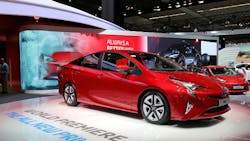Is Toyota Breaking Ground, or Playing Catch-Up?
With what’s under the hood fast becoming less important that what’s in the programming and circuitry, the race is on for automakers to stake a claim in Silicon Valley. The latest contender is Toyota, which last week announced it was investing $1 billion in a new company dedicated to artificial intelligence research.
The Toyota Research Institute Inc. will straddle two coasts, with headquarters in Silicon Valley near Stanford University and a second facility in Cambridge, Mass., near the Massachusetts Institute of Technology. Toyota is also investing an additional $50 million each in Stanford and MIT to establish joint artificial intelligence research centers.
TRI’s initial goals, according to new executive technical adviser Gill Pratt, are to improve safety; make driving accessible to everyone; and apply Toyota technology used in outdoor mobility to indoor environments, particularly to assist elderly people.
But does Toyota, known for high-quality vehicles and super-efficient production, really have anything new to add to the technological transformation already occurring in the auto industry? Google is racking up millions of miles with its driverless vehicles and in October Tesla released its automated lane-changing software to its Model S owners.
While little is groundbreaking about Toyota’s announcement, says Max Zanan, automotive industry expert for IDDS Group, it recognizes that “in the future, software will be way more important than hardware. Toyota, Mercedes and BMW are excellent in building hardware, but in order to get a competitive edge, they need to have the software that lives up to the consumer’s expectation.”
Zanan predicts that companies “of Toyota’s caliber” will be able to catch up “because we are still in the beginning stages of developing smart hardware.”
Alex Wyglinski, associate professor of electrical and computer engineering at Worcester Polytechnic Institute, is a researcher in wireless communications. Long before last week’s announcement, Toyota established a subsidiary in Mountainview, Calif., dedicated to breakthrough technology. The subsidiary, Toyota InfoTechnology Center, sponsored Wyglinski’s research for three years.
The subsidiary provided insight to Toyota Motor Corporation "regarding infotechnology and how communication to connected vehicles could be used in the viability of technology and their products,” he said. “I’m not surprised they set up a similar entity to specifically address artificial intelligence and autonomous vehicles.”
Wyglinski thinks the most interesting part of the Toyota venture, besides the fact that it’s a separate company from Toyota, is the attempt to connect separate research going on at Stanford and MIT. MIT focuses on artificial intelligence (understanding the mechanisms of intelligent behavior and applying them to machines) while Stanford is known for vision processing (teaching machines to process, analyze and understand images).
“What you’ve got is a combination of vision, which would be the main sensory input to an autonomous vehicle, and one of the world leaders in artificial intelligence contributing to this initiative at Toyota,” he said.
Artificial intelligence is critical to parsing and making sense of all the data “as vehicles get more and more sensors in them, and the engineers start trying to tie these different sensor signals together to create a cohesive image of the space around the car to navigate through,” said Sam Abuelsamid, senior auto industry analyst for Navigant Research. “For all the flaws that humans have and the mistakes that we make, the human brain is actually remarkably good at processing a lot of data in a very short time and dealing with a lot of nuance. Traditional control software is not that good at picking up the nuances and making the right decisions.”
Abuelsamid said the only thing that surprised him about the Toyota announcement was that it didn’t come a lot sooner, as Toyota was an early leader of advanced driver assistance systems, like radar-based adaptive cruise control.
“From a PR perspective, [Toyota] doesn’t want to be perceived as being left behind,” he said. “Even though Apple hasn’t publicly done anything, they’ve certainly gotten a lot of attention in the last six months.”
“Google’s definitely the big elephant in the room here,” he added. “They have more experience and knowledge with artificial intelligence and machine learning than just about anybody. They’ve probably got a big lead on everybody.”
The indoor mobility piece of the new Artificial Intelligence Center ties in with the fact that people are living longer and younger buyers, with high debt and less disposable income, are delaying joining the ranks of new-car buyers. Automakers, in turn, are looking for new ways to be profitable, beyond individual car ownership.
In this area, Toyota will have some catching up to do with Honda and possibly GM, Abuelsamid said. Both automakers have been working on indoor mobility technology for years. In 2009, Abuelsamid visited Honda’s research and development facility and saw their stride motion and lift assist systems.
“They were looking at it from a number of different perspectives, to help people that have reduced mobility for whatever reason, but also to help workers in factories to reduce strain,” he said.
General Motors has similar technology, particularly with Robonaut II, the humanoid robot developed with NASA that is currently on the International Space Station. The K-Glove, a robotic glove that acts as a multiplier to enhance grip, came out of that work.
“I think that’s partially why [Toyota’s] investment is so large,” said Abuelsamid. “These are areas other companies have been working on for some time.”
About the Author

Laura Putre
Senior Editor, IndustryWeek
As senior editor, Laura Putre works with IndustryWeek's editorial contributors and reports on leadership and the automotive industry as they relate to manufacturing. She joined IndustryWeek in 2015 as a staff writer covering workforce issues.
Prior to IndustryWeek, Laura reported on the healthcare industry and covered local news. She was the editor of the Chicago Journal and a staff writer for Cleveland Scene. Her national bylines include The Guardian, Slate, Pacific-Standard and The Root.
Laura was a National Press Foundation fellow in 2022.
Got a story idea? Reach out to Laura at [email protected]
